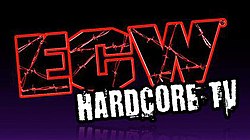ECW Hardcore TV
| ECW Hardcore TV | |
|---|---|
 |
|
| Also known as | NWA Eastern Championship Wrestling (1993-1994) Extreme Championship Wrestling (1994-1999) |
| Created by |
Tod Gordon Eddie Gilbert |
| Starring | See Extreme Championship Wrestling alumni |
| Narrated by | Joey Styles |
| Opening theme | "Closer"/"Thunderkiss '65" mix by Nine Inch Nails & White Zombie (1994-1997) "This Is Extreme!" by Harry Slash & The Slashtones (1997-2001) |
| Country of origin | USA 2 specials from Japan |
| No. of episodes | 401 |
| Production | |
| Executive producer(s) | Paul Heyman (September 1993 - 2000) |
| Location(s) | Burt Flickinger Center, Buffalo NY |
| Camera setup | Multicamera setup |
| Running time | 58 minutes (with commercials) |
| Release | |
| Original network | Syndication |
| Original release | April 6, 1993 – December 31, 2000 |
| Chronology | |
| Followed by | ECW on TNN |
ECW Hardcore TV was a professional wrestling television program of Philadelphia-based promotion Extreme Championship Wrestling (ECW) composed of footage from live shows and recorded interviews. It ran in syndication from 1993 until 2000.
Even after ECW gained a nationally-available television program on The Nashville Network (TNN), Hardcore TV was considered ECW's flagship program. The rights to the show now belong to World Wrestling Entertainment (WWE). The show was voted as Best Weekly Television Show in the 1994, 1995 and 1996 Wrestling Observer Newsletter Awards.
Hardcore TV was edited from footage of ECW's live events from the ECW Arena and other house shows. It also included backstage promos & vignettes, which were not shown to the live crowd or included on home video releases of the events. A segment called Hype Central advertised upcoming events and ECW merchandise in a tongue in cheek manner.
Music videos from major musical acts were sometimes shown, interspersed with footage detailing the history of current feuds, as well as spectacular spots. Frequently, the ending of the show would feature a montage of several different promos, with Dick Dale's cover version of "Misirlou" as background music. These became known as "Pulp Fiction promos". The purpose of these promos was to maximise the show's limited airtime in order to keep the fans up with all the current wrestling storylines.
...
Wikipedia
